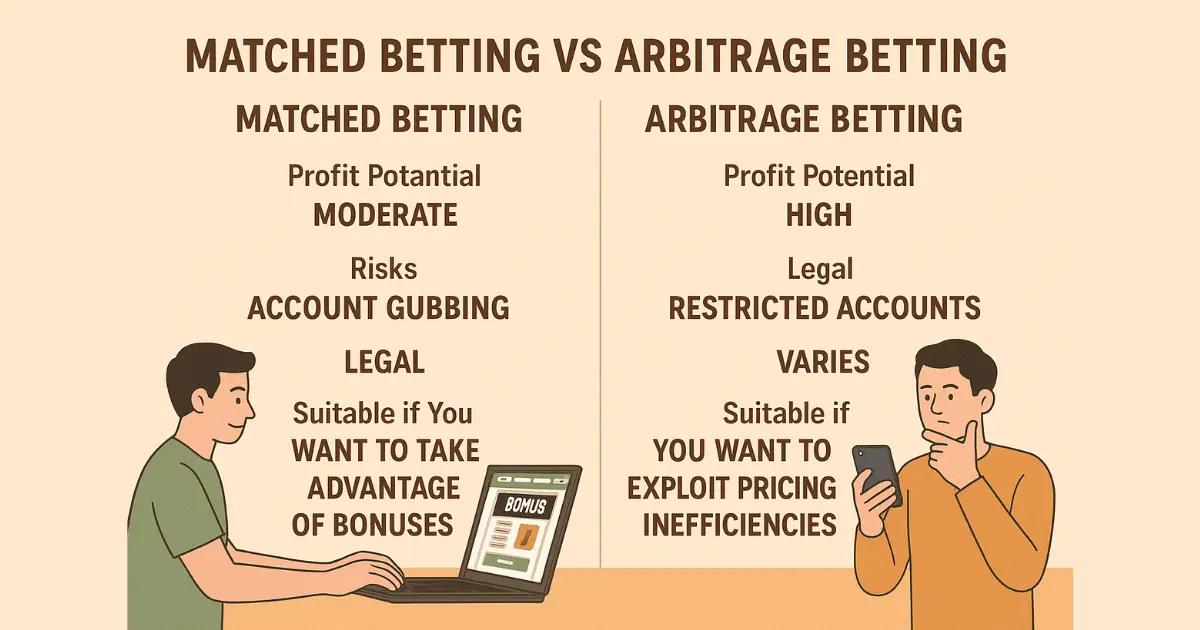
🎯 Key Takeaways
- ✓ Matched betting offers lower risk and easier entry with sign-up bonuses but has limited long-term potential
- ✓ Arbitrage betting provides higher profit ceilings and continuous opportunities but requires more capital and time
- ✓ Both strategies are legal but face quick account restrictions from bookmakers
- ✓ Beginners should start with matched betting before progressing to arbitrage
Introduction
When comparing matched betting vs arbitrage betting, both strategies offer risk-free profit opportunities through mathematical advantage rather than gambling luck. While matched betting exploits bookmaker promotions and arbitrage betting capitalizes on odds discrepancies, each approach suits different goals, experience levels, and financial capabilities.
Profit Potential: Matched Betting vs Arbitrage Returns
Matched Betting Earnings
Matched betting typically generates steady supplemental income rather than life-changing sums. New practitioners often earn $200-1,000+ monthly by exploiting sign-up bonuses and free bets. The strategy excels in short-to-medium term gains, with most people maximizing a few thousand dollars total profit over time.
Key earning characteristics:
- Initial Phase: High returns from welcome bonuses (70-80% profit conversion)
- Ongoing Phase: Lower monthly earnings from reload offers
- Capital Requirement: Can start with $50-100
- Time Investment: Part-time friendly, flexible scheduling
Arbitrage Betting Income
Arbitrage offers superior long-term profit potential, especially after promotional opportunities diminish. With sufficient bankroll and multiple bookmaker accounts, beginners can target over $1,000 monthly profits, while experienced arbitrageurs with substantial capital earn significantly more.
Profit scaling factors:
- Bankroll Dependency: Returns scale directly with available capital
- Recommended Minimum: $2,000-5,000 for comfortable profits
- Growth Potential: Unlimited theoretical ceiling through reinvestment
- Time Commitment: Often requires full-time dedication for serious returns
"Tax Considerations: In countries like the UK, Canada, and Australia, gambling profits remain tax-free, while US residents must report all gambling winnings as taxable income.
Risk Assessment: Safety Comparison
Matched Betting Risk Profile
Matched betting is considered very low-risk when executed properly. By covering all outcomes through back and lay bets, practitioners lock in guaranteed profits regardless of event results.
Primary risk factors:
- User Error: Miscalculating stakes or entering incorrect odds
- Technical Issues: Website outages during critical bet placement
- Account Restrictions: "Gubbing" prevents future profits but doesn't cause losses
- Qualifying Bet Friction: Small losses on non-promotional bets
Arbitrage Betting Risk Considerations
While theoretically risk-free per bet, arbitrage carries higher operational risks due to timing sensitivity and market volatility.
Key risk elements:
- Odds Movement: Price changes between bet placements can create exposure
- Execution Speed: Slow internet or delayed reactions can ruin arbitrage opportunities
- Bet Voiding: Bookmakers may cancel obvious pricing errors
- Account Limitations: Faster detection leads to quicker restrictions
Legal Status and Bookmaker Relations
Legality Framework
Both strategies remain completely legal in jurisdictions where sports betting is permitted. No laws prohibit placing bets on all outcomes - practitioners simply exploit available markets advantageously.
Bookmaker Treatment Differences
Bookmakers actively combat both approaches as forms of "advantage play" that guarantee customer profits rather than losses.
Matched Betting Detection:
- Often lasts longer under bookmaker radar
- Mixing occasional genuine bets can extend account longevity
- Small profit margins may appear like normal betting activity
- Typically results in promotional restrictions rather than account closure
Arbitrage Detection:
- Rapid identification, sometimes within a few bets
- Constant targeting of mispriced odds creates obvious patterns
- Large stakes on small margins trigger immediate attention
- Often leads to complete account limitations or closure
| Strategy | Detection Speed | Typical Penalty | Mitigation Options |
|---|---|---|---|
| Matched Betting | Moderate | Promo restrictions | Mixed betting patterns |
| Arbitrage | Very Fast | Account limitations | Multiple accounts (risky) |
Required Tools and Learning Curve
Matched Betting Requirements
Learning matched betting proves beginner-friendly with minimal prerequisites. Most people grasp the fundamentals within hours and achieve proficiency within days.
Essential tools:
- Betting Exchange Access: Betfair, Smarkets for laying bets
- Odds Matching Software: Services like OddsMonkey (UK-focused)
- Matched Betting Calculator: For precise stake calculations
- Multiple Bookmaker Accounts: For accessing various promotions
Arbitrage Betting Demands
Arbitrage requires advanced skills and sophisticated technology for success. The learning curve is steeper, demanding deep understanding of odds movements and lightning-fast execution.
Required infrastructure:
- Arbitrage Calculator: For profit margin calculations
- Odds Scanning Software: Real-time opportunity identification
- Multiple Monitors: Simultaneous bookmaker monitoring
- Fast Internet Connection: Critical for timing advantages
- Extensive Account Network: Maximum opportunity access
Strategic Advantages and Limitations
Matched Betting Pros
- Nearly Risk-Free: Mathematical profit guarantees when executed correctly
- Low Barrier Entry: Minimal capital and knowledge requirements
- Flexible Schedule: Part-time compatibility with other commitments
- Tax-Free Earnings: In many jurisdictions, gambling profits aren't taxed
- Beginner-Friendly: Straightforward learning process with abundant guides
Matched Betting Cons
- Limited Longevity: Account restrictions eventually end profitable runs
- Finite Promotions: One-time bonuses create earning ceilings
- Declining Returns: Monthly profits decrease after initial bonus period
- Time Investment: Organization and execution require consistent effort
Arbitrage Betting Pros
- Unlimited Opportunities: Not dependent on promotional availability
- Scalable Profits: Returns increase with capital and commitment
- Continuous Revenue: Ongoing income potential without promotional limits
- Mathematical Certainty: Guaranteed profits on properly executed trades
Arbitrage Betting Cons
- High Capital Requirements: Significant bankroll needed for meaningful returns
- Intense Time Commitment: Often demands full-time attention
- Rapid Account Restrictions: Quicker detection and limitations
- Operational Complexity: Requires advanced tools and constant monitoring
Regional Considerations
United Kingdom
The UK offers optimal conditions for both strategies with competitive bookmaker markets and tax-free gambling winnings. However, British bookmakers quickly limit successful advantage players.
United States
Legal sports betting expansion creates opportunities, though limited betting exchange access complicates matched betting execution. Gambling winnings face taxation, reducing net profitability.
Australia
Strong promotional offerings and Betfair exchange access support both strategies. Advertising restrictions on sign-up bonuses require more research to discover available offers.
Canada
Evolving legal landscape provides growing opportunities, particularly in Ontario's open market. Tax-free gambling winnings enhance strategy appeal.
Conclusion
When evaluating matched betting vs arbitrage betting, matched betting serves as an excellent introduction to advantage play with immediate returns from promotional exploitation. Arbitrage betting offers higher long-term potential but demands significant capital, time, and technical expertise. Many successful practitioners begin with matched betting to build bankrolls and experience before transitioning to arbitrage strategies.
Both approaches require understanding that bookmaker restrictions are inevitable, making account management and detection avoidance crucial for sustained success. Always gamble responsibly and never risk money you cannot afford to lose.



